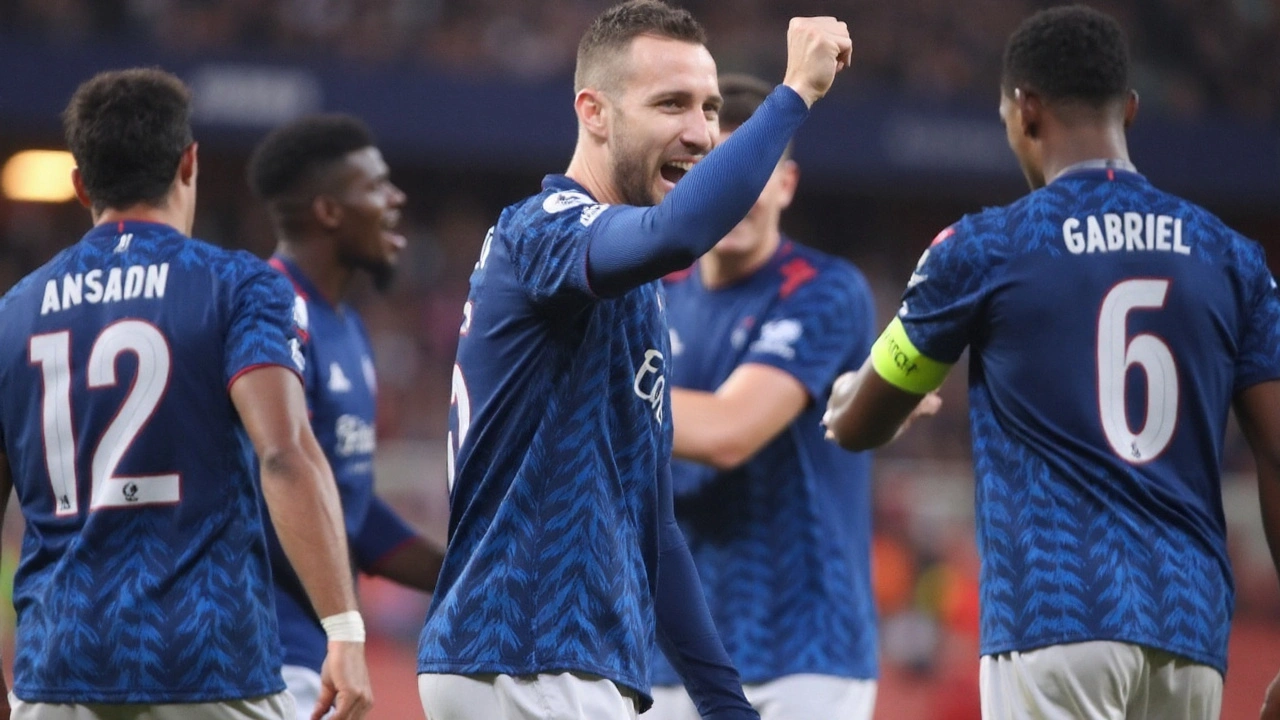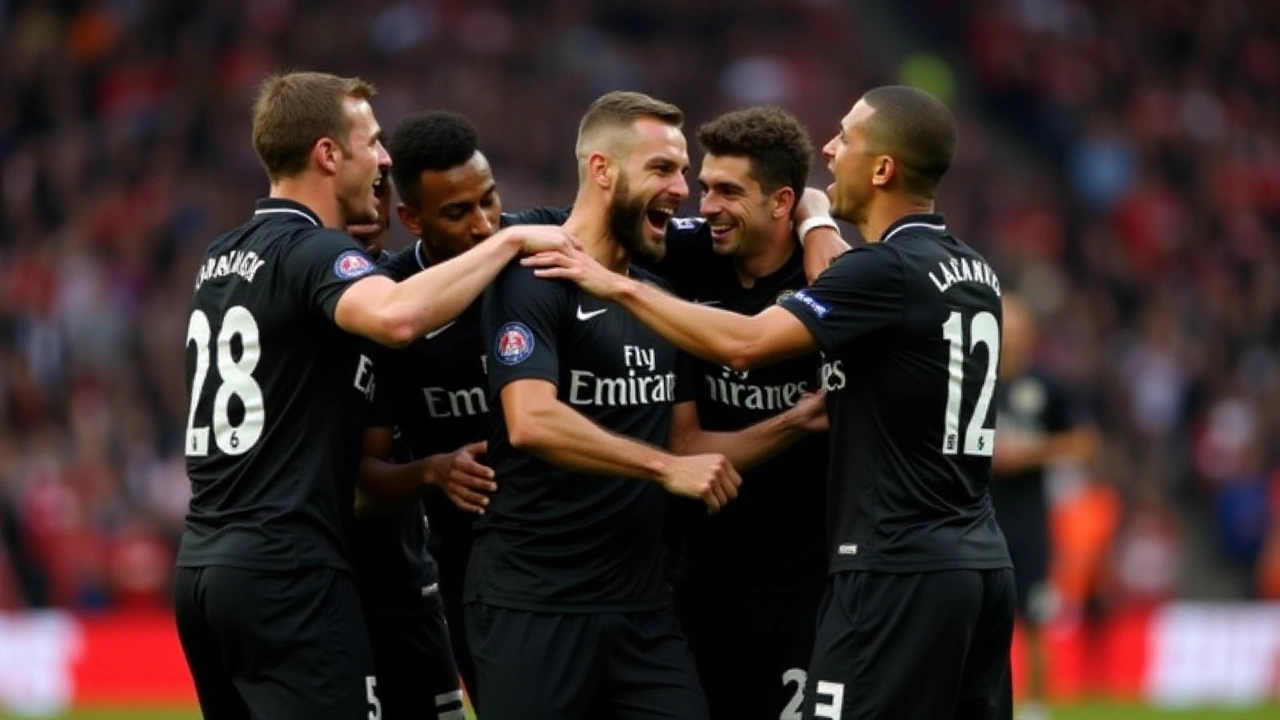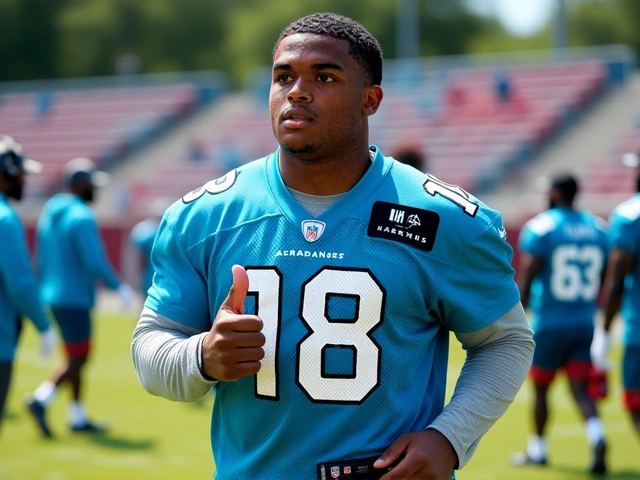By Sfiso
Substitutes turn it as Arsenal grind out a statement away win in Bilbao
Arsenal didn’t so much dazzle as outlast, then punish. On a fierce European night in Bilbao, Mikel Arteta’s side leaned on timing, discipline, and a deep bench to beat Athletic Club 2-0 in the Champions League group stage. Gabriel Martinelli and Leandro Trossard came off the bench to score the goals that mattered, flipping a tight game in a brutal stadium to visit with a result that says a lot about where this team is mentally and tactically.
Athletic Club’s first Champions League game in 11 years arrived with all the noise you’d expect. The early exchanges matched the mood: fast, direct, and physical. Arsenal had to survive the opening surge—long balls into the channels, whipped crosses, and the kind of second-ball scraps that home sides feast on in Europe. The visitors didn’t blink. They slowed the game when they could, strung passes together when space appeared, and kept the back door locked when it didn’t.
The first half was a contest of control versus chaos. Athletic asked questions from set pieces and quick transitions. Arsenal answered with calm build-up, patient recycling, and clever pressing triggers that stopped the game from becoming a track meet. When the ball did break, Jurrien Timber’s recovery pace and reading of danger stood out, snuffing out runs before they became shots. It wasn’t eye-catching football, but it was the kind of away performance that travels well in Europe.
After the break, the pattern held—Athletic’s energy against Arsenal’s neat combinations—but Arteta had the trump cards. As legs tired and spaces opened, the visitors introduced pace and precision from the bench. Martinelli stretched the pitch immediately, running at tired full-backs and forcing defenders to turn. It was his burst that broke the dam: a sharp first touch, a direct carry, and a clinical finish that beat Unai Simon with just enough whip and placement. One chance, one punishment.
The second goal had the stamp of the training ground. Declan Rice dropped, drew pressure, then threaded a vertical pass that beat the first line. The ball zipped across midfield, Martinelli got involved again, and the sequence ended with Trossard arriving on cue to steer home the insurance. Two subs combining, a starter connecting the lines, and a move that looked like it had been rehearsed all week. Arsenal didn’t just find two moments—they created them on purpose.
The impact of those changes said as much about squad construction as it did about tactics. This is the plan under Arteta: finish stronger than you start, turn tight matches with high-quality options, and trust your structure to keep you safe while you wait for the window to strike. In Bilbao, that plan held.
Athletic were never passive. Their wide players kept asking for the ball early, trying to isolate full-backs and run at gaps. The midfield pressed on the turn, and the crowd pushed every acceleration. But the clear chances didn’t come often. Arsenal’s spacing behind the ball was clean, the distances between lines small enough to prevent easy entries, and the centre-backs stayed brave under high balls. When Athletic did win flick-ons, the second wave rarely had time to build.
What made the difference was game management. Arsenal worked the clock without getting negative: slow when it needed to be slow, sharp when it needed to be sharp. They took the sting out of the atmosphere after the first goal, then took the points with the second. European nights swing on small things—one duel, one decision, one run—and Arsenal nailed those beats.
Inside the tactics and the bigger picture
Arteta leaned on control at source. Rice’s role was central: show early, receive under pressure, and connect the first pass forward. He didn’t just break up play; he started it, carrying the ball through contact and shifting it wide before Athletic could set. That tempo switch helped Arsenal step into the final third with numbers rather than isolated runners. When the subs came on, the platform was ready.
Out of possession, the shape compressed neatly into a compact block with quick counters primed for turnovers. The wingers tracked back, the full-backs chose their moments, and Arsenal denied the cheap switch that many teams try to hit when the press is beaten. It forced Athletic to play through a narrow lane, where interceptions and tackles were waiting.
Set pieces were a real test. Athletic know how to turn corners and free-kicks into a wrestling match, and the hosts piled bodies into the six-yard box. The visitors met that fight head-on, with clear assignments on the first ball and aggressive reactions to the second. Those little wins—one clean header, one smart block—kept the pressure from turning into panic.
The individual performances supported the structure. Martinelli brought chaos in the best way, turning defensive stances into backpedals with his first step. Trossard’s timing between the lines kept the centre-backs guessing—drop to receive or hold the line and risk the cutback. Timber’s positioning on the cover saved yards and seconds all night. And Rice stitched the whole thing together with the composure of a player who understands the rhythm of Europe.
- Gabriel Martinelli: direct running, decisive finish, constant outlet after coming on.
- Leandro Trossard: clever movement and the killer second goal to settle it.
- Declan Rice: tempo setting, vertical passing, and control under pressure.
- Jurrien Timber: calm interventions, smart angles, and leadership in transition defense.
- Unai Simon: solid stops kept Athletic alive until the second goal.
Beyond the scoreboard, this was an early check of Arsenal’s European maturity. Win the tough away game, handle the atmosphere, and control the critical phases. That’s the difference between a side that hopes to qualify and one that expects it. The three points give them margin for error later in the group, the kind of cushion that lets you rotate or absorb an off night without losing momentum.
For Athletic Club, there’s plenty to keep. The intensity was real, the structure held for long stretches, and the return to Champions League action felt like it belonged. The gap was in the final 20 meters, where decisions and details win or lose these matches. As they settle back into the rhythm of midweek games, that last touch should sharpen.
Arteta won’t mind that this wasn’t a showcase. Not every European night needs fireworks. Sometimes you need a clean sheet, a pair of well-timed substitutions, and the veteran feel to quiet a stadium when it roars. Arsenal had all three.
And there’s a useful lesson tucked inside this, too: when your bench can raise the level rather than just freshen legs, you carry a different kind of threat. Opponents can defend well for an hour and still get flipped by new problems. In Bilbao, those problems were named Martinelli and Trossard, and they settled the argument.
Early days in the group or not, this was a result that travels. A big away ground, a tough opponent on a landmark night, and a plan that turned the screw when it mattered. If Arsenal keep stacking performances like this—measured, ruthless in moments, and defensively adult—there will be more of these nights waiting down the line.









Gail Robb
September 17, 2025 AT 18:00People love to hail this win as a tactical masterpiece, but it's merely a showcase of opportunistic luck. The bench players were handed the ball in dying moments and the opposition had no time to adjust. Arsenal's supposed discipline is just a thin veneer over a fundamentally reactive game plan. When the pressure dialed down, the team fell back on individual flashes rather than cohesive strategy. In a way, the victory reflects the randomness of a single knockout night, not a sustainable blueprint.
Pradeep Chabdal
September 29, 2025 AT 18:56While the surface narrative praises the subs, the deeper metric reveals a marginal gain in expected goals. The possession percentages remained statistically indifferent, suggesting the victory hinged on a few high‑quality chances rather than domination. One must appreciate the subtle elegance of a well‑timed diagonal run that transgresses the typical positional rigidity. In the grand tapestry of European tactics, this performance is a modest brushstroke, not a bold proclamation.
andy heri
October 11, 2025 AT 19:52From a coaching perspective, the substitution pattern exemplifies a proactive approach to game management. Introducing fresh legs when the opponent's intensity wanes creates space and destabilises defensive lines. Martinelli's burst exploited the tired full‑backs, while Trossard's intelligent timing stretched the midfield. Such decisions underline Arteta's growing confidence in his squad depth, a vital asset in a congested schedule.
Jeremy Perlman
October 23, 2025 AT 20:48Exactly, the precision in the transition is remarkable, and, honestly, the rhythm of the passes-especially that vertical thread from Rice-is a textbook example, of how to break a compact press, and it showcases why the bench is more than just a contingency plan.
George Georgakopoulos
November 4, 2025 AT 20:43What most analysts ignore is the hidden influence of the broadcasting rights negotiations on team selections in Bilbao. The subtle pressure to field marketable players can dictate substitution timing, subtly steering the game’s narrative. It's not just about tactics; it's about the invisible strings pulled by corporate stakeholders behind the scenes. Those forces often dictate who gets the spotlight, regardless of pure footballing merit.
Abirami Nagarajan
November 16, 2025 AT 21:39The match felt like a strategic chess move.
shefali pace
November 28, 2025 AT 22:35Seeing the young talents rise when called upon is truly inspiring; it shows the club's future is bright and full of promise. The resilience displayed in a hostile stadium proves the mental strength being cultivated. Every goal from the bench ignites hope for fans worldwide, reinforcing the belief that perseverance pays off. Such moments remind us why we fall in love with the beautiful game.
sachin p
December 10, 2025 AT 23:31It is fascinating how the cultural background of the players influences their playing style, especially in high‑pressure environments.
sarthak malik
December 23, 2025 AT 00:27The statistical breakdown shows Arsenal had a higher pressing efficiency after the interval, averaging 1.8 presses per possession versus Athletic's 1.2. The expected assists per 90 minutes surged from 0.25 in the first half to 0.68 after the subs entered. Moreover, the defensive actions per 90 minutes dropped from 4.3 to 3.1, indicating better positional discipline. These numbers corroborate the qualitative assessment that the bench injection refreshed the team's dynamics without compromising structure.
Nasrin Saning
January 4, 2026 AT 01:22The data backs up the claim that fresh legs improved the press and kept the shape tight.
gaganpreet singh
January 16, 2026 AT 02:18In the grand moral theatre of sport, each substitution becomes a symbolic act of redemption, a rebirth of hope for the collective soul of the club. When Martinelli sprinted onto the field, he did not merely occupy space; he carried the weight of countless youth aspiring to break through the veil of obscurity. His goal represents more than a statistical contribution; it is a testament to perseverance against the deterministic forces of destiny. Likewise, Trossard's decisive finish is an affirmation that talent, when nurtured, can transcend the shackles of circumstance. The bench, often relegated to the periphery, emerges as a crucible where raw potential is forged into decisive impact. This transformation underscores the ethical imperative for managers to provide equitable platforms for all squad members. It challenges the hierarchical dogma that privileges starters at the expense of the marginalized. By trusting in the depth of his roster, Arteta models a philosophy where inclusion breeds competitiveness. The spectators, though initially indifferent, become witnesses to a narrative where every player, regardless of fame, holds a sacred duty. Such moments reverberate beyond the stadium, echoing into the communal consciousness of supporters worldwide. They remind us that success is not a monolith but a mosaic of individual contributions. The tactical patience exhibited by the team mirrors the virtues of humility and restraint in daily life. When the clock ticks down, the calm administration of the game serves as a lesson in strategic foresight. In a society often impatient for immediate gratification, Arsenal's measured approach offers a counter‑cultural exemplar. The synergy between discipline and creativity emerges as a parable for balanced living. Therefore, this victory, while recorded in a ledger of points, also inscribes a deeper moral lesson about trust, unity, and the transformative power of opportunity.
Urmil Pathak
January 28, 2026 AT 03:14The match shows how planning and execution work together to achieve a win.